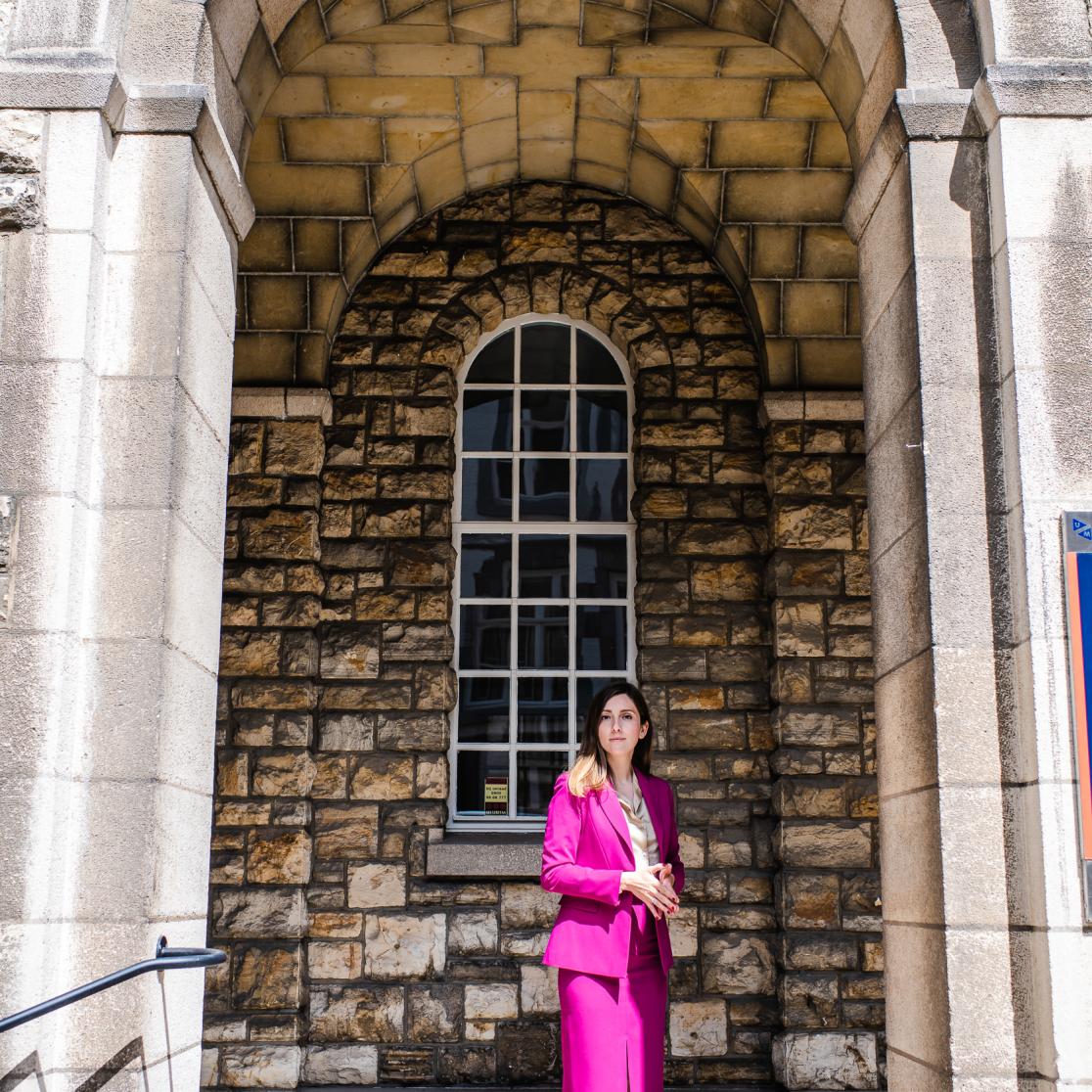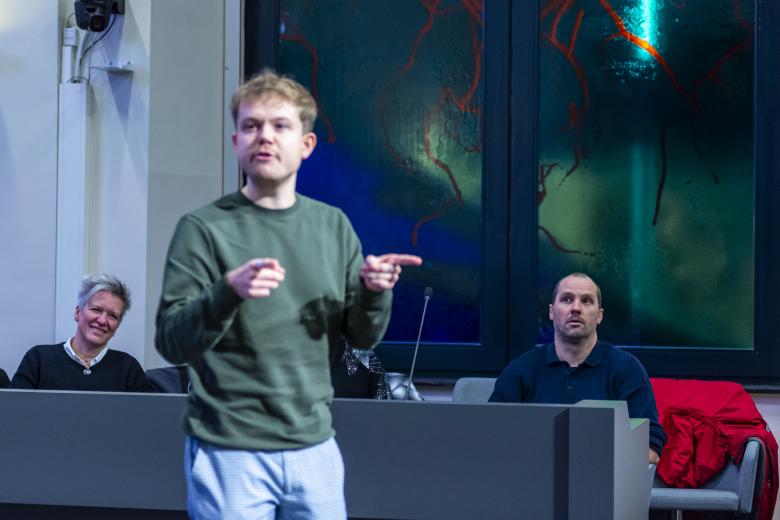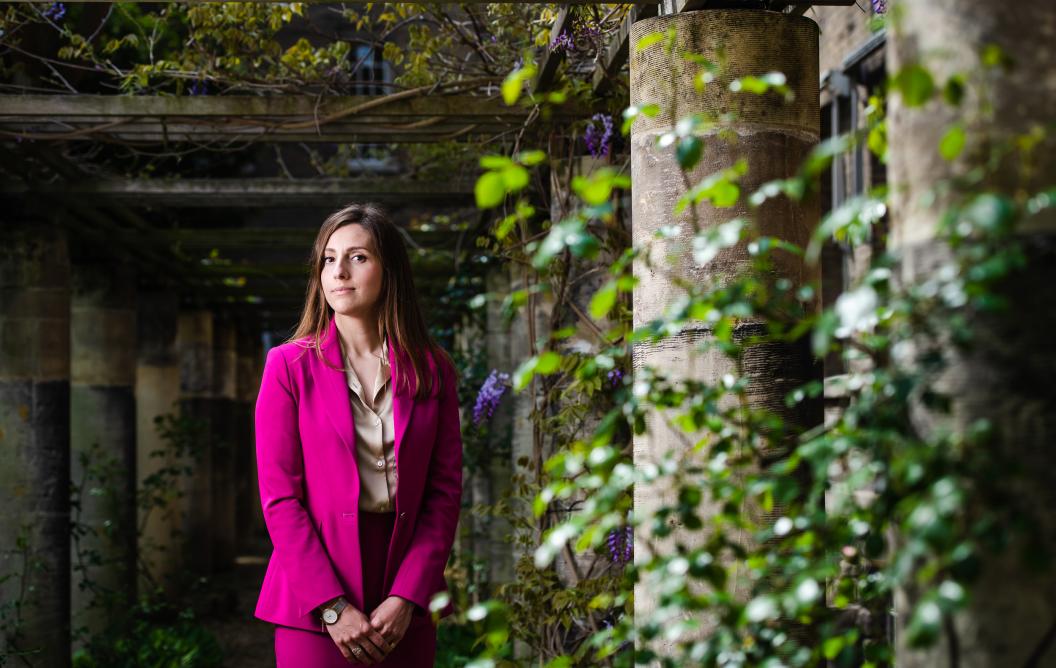“I’m standing on the shoulders of many people”
At the end of the interview, Vigjilenca Abazi shares her mother’s perspective on the fact that, eleven years after she left North Macedonia to do a one-year master’s programme in the Netherlands, she’s still here. “I’d rather miss you because you’re far away but giving the best of yourself to the world, than to have you nearby and you not be fulfilling your potential.” Abazi’s potential is easy to recognise, which is reflected in the reactions from several mentors and juries in her academic career thus far. She is lucky (or is it foresight?) that her research topics, such as her work on the legal protection of whistleblowers, often appear in the news. Recently, she was presented with an Early Career Award by the KNAW. This is Vigjilenca Abazi’s impressive story.
When she speaks about being presented with the KNAW Early Career Award, which she received both for her innovative research as well as for her social contributions, she’s almost at a loss for words to describe what it meant to her. People who have heard her speak will know that this is a rare occurrence. She was born in Croatia, raised in North Macedonia until she was 21, and speaks perfect English with a slight American accent. “I’m an ethnic minority in North Macedonia, so a lot of my life has been shaped by stories of challenge, war, struggle and ethnic tensions. If you have faced discrimination, even if it’s subtle, it is so liberating to be in a society where your identity is not held against you, where you’re given opportunities because you’re honest, you work hard and show results, where you can run as fast as you can because no one is stopping you.”
How it started with voluntary work
When she was doing voluntary work with the Red Cross as a teenager in North Macedonia, she already felt that addressing problems at an individual level didn’t fulfil her completely. “Social change and politics were common conversation topics around the dinner table at home and my parents appreciated the opinions of me and my siblings.” Against that background, the idea grew that studying law was a way to change things for the better on a larger scale. “It’s in my DNA: if you want to do something, you might as well do something that benefits other people. That’s what brings me joy in my work.”
How she was recognised as a researcher
After finishing her bachelor’s degree in law in Skopje, North Macedonia, she wanted to take up the challenge of studying abroad. “To me, the world is my oyster and I like to put myself in positions where I can grow.” She applied to several universities and she had a strong preference to do a master’s programme at Maastricht University, but to her disappointment, scholarships were not available for that programme. In a worldwide competition, she was awarded the Amsterdam Merit Scholarship by the University of Amsterdam (UVA), so she started the one-year programme in International and European Law. A few weeks into the LL.M., she wrote a paper on human rights and the professor asked her to step forward in class, because Abazi’s paper was excellent and the professor wanted to publish it on Blackboard as an example. “I was falling off my chair!”, Abazi notes. Recognising her talent in research, the professor asked her after class if she would work as a student research assistant for the department. Later that year, one of the professors she worked for encouraged her to apply for a PhD position. “I want to stress that in my story because if these professors had not seen the potential in me and nudged me to apply, I would not have thought I was ready yet.”
How Snowden created momentum for her PhD research
At merely 22 years old, Abazi applied for a PhD position at UvA and, to her surprise, she got an interview. She went in with the confidence to be completely herself because she thought she had already made it much further in the highly competitive selection process than she had imagined and hence she had nothing to lose. It was the start of her PhD research that led to the dissertation and book ‘Secrecy and Oversight in the European Union: The Law and Practice of Classified Information’, published by Oxford University Press. “It was an interesting topic, but initially people didn’t think about it a lot—until Edward Snowden leaked documents about surveillance and privacy. And then everybody was talking about classified information, which I was writing a book about.” She got to speak at various universities about her research, including at Harvard Law School. “This was next-level academic research. I had become an independent researcher, an expert, and my voice mattered.” The year she spent at Columbia Law School in New York during her PhD, on a Fulbright Scholarship, also contributed a lot to that personal development.
How to finish a PhD in nine weeks
When she returned to Amsterdam from New York, she officially had eight more months left to finish her PhD. “At that time, I saw a position at Maastricht University for a postdoc. Maastricht University had always been in the back of my mind. They were looking for someone who could start soon, but I applied anyway and we agreed I would start in June, whereas I was supposed to finish my PhD in September.” For nine weeks straight, every single day, Abazi worked in the library, from eight in the morning until six in the afternoon. “I submitted my PhD on a Friday, cleaned up my room over the weekend and started working in Maastricht on Monday. I think you can only do that at the age of 26; it was crazy when I look back at it.”
How the news again reflects her research
Abazi seems to thrive when she’s doing multiple things at the same time. The week before her PhD defence, in December 2015, she wrote a legal memo for the European Parliament about the legal possibilities for adopting a law to protect whistleblowers. She helped to identify a legal path that shifted the legislative debate from ‘Can we do it?’ to ‘How can we best do it?’. “My Veni grant that I received in 2018 has to do with protecting whistleblowers. These are individuals who are putting so much on the line for accountability, but are paying a high personal cost.” The legal debate on whistleblowing took off in Brussels and important events built up political pressure for the law to be adopted, including the murders of two journalists, in Malta and in Slovakia. In 2019, the EU Whistleblower Directive was adopted. For the past two years, Abazi been working together with Eurocadres (which represents trade unions) on a project funded by the European Commission to help with the national implementation of the law. “I’m passionate about changing the dynamics of whistleblowing, so it’s no longer one person against a machine—because no matter how strong you are, fighting alone is just too hard.”
How her background is reflected in her research
She paints the bigger picture of her current research in a passionate plea. “Traditionally, we have the power of the state and of private parties, but at the moment, power is constantly shifting. More than ever, power is invisible—I mean the real power, like Facebook with two billion users worldwide. It is in this context of power that I’m trying to figure out how we can keep power in check and hold the powerful accountable. We need to rethink the system. How do people fit in this very complicated world of power and accountability, where public and private power are mixed in a way that creates a lot of uncertainty?” She feels her background ties together perfectly with the topics she works on. “Because I truly believe in holding power accountable. And with these types of issues, law can have a protective value, ensuring that there’s accountability and transparency.”
How you can have both roots and wings in Maastricht
Maastricht University has felt like an academic home for her, she says. “This nurturing, supportive environment gives me both roots and wings. I feel welcomed here, but I also felt it was appreciated if I spent time at other universities to advance my research. There was always a door open to return to Maastricht.” And she did. “After a year in Maastricht, I was promoted to an assistant professor. At that point, I realised that my first master’s programme almost passed me by, because I was so young at the time. I wanted to do a second master’s, on my terms.” Abazi went to Yale Law School and, among other programmes, she was selected for the programme in U.S. Foreign Policy taught by former Secretary of State John Kerry. “At Yale, I wanted to improve my writing skills. I truly believe it is our job as scientists to discover complex things and then simplify them, to make them understandable for everyone, because we shouldn’t live in a society where knowledge is exclusive. University research should be beneficial for every Dutch citizen.”
Next to her own research and teaching, Abazi used to be the research coordinator of CERIM, the Centre for European Research in Maastricht. “I’m kind of a restless person, as you might have noticed by now”, she laughs. And then there’s the organisations that she dedicates her spare time to, which all have a connection with her home country or region. She founded Stella, for instance, a non-profit mentorship organisation that helps girls and women to pursue further education or to advance in their careers. “Because I stand on the shoulders of so many people who have helped me in so many ways. I’ve been very fortunate in that regard, but so many girls don’t have that.”
By: Femke Kools (text) Casey O'Dell (translation) and Jonathan Vos (photography).

How to spend the KNAW prize money
Abazi is yet to decide how she will spend the 15,000 euros from the KNAW award, but she knows it will be related to whistleblowers and supporting other young academics.
“I’m trying to see if I can use the funding to free up some time for working with whistleblowers themselves. I’ve been in touch with an advocacy organisation in Washington D.C., which is the world’s leading firm in representing whistleblowers and they have accepted me as a senior international fellow.
At the end of the day, we need to know more about whistleblowers and I think this might give them a unique voice. I also want to use part of the money to support young academics who come from vulnerable backgrounds, like myself.” And who have a bright future, that’s for sure.
Also read
-
More than another ‘to-do’: how the UTQ helped me rethink my teaching
At Maastricht University, the University Teaching Qualification (UTQ) is a professional development programme designed to strengthen teaching and learning. It supports teachers in developing core teaching competencies through a combination of workshops, peer learning, on-the-job experience, and...

-
It’s not easy being green: the challenges and benefits of international research collaboration
As the world seeks cleaner energy solutions, green hydrogen has emerged as a key component in the transition to a sustainable future. Many governments have drawn up policies to support this technology, but competing priorities mean initiatives often fall short. Fabianna Bacil, a PhD candidate at UNU...

-
A new outlook on rehabilitation care
Ivan Huijnen (CAPHRI) aims to shift from the biomedical 'disorder-focused' thinking to an integral view on healthcare.

